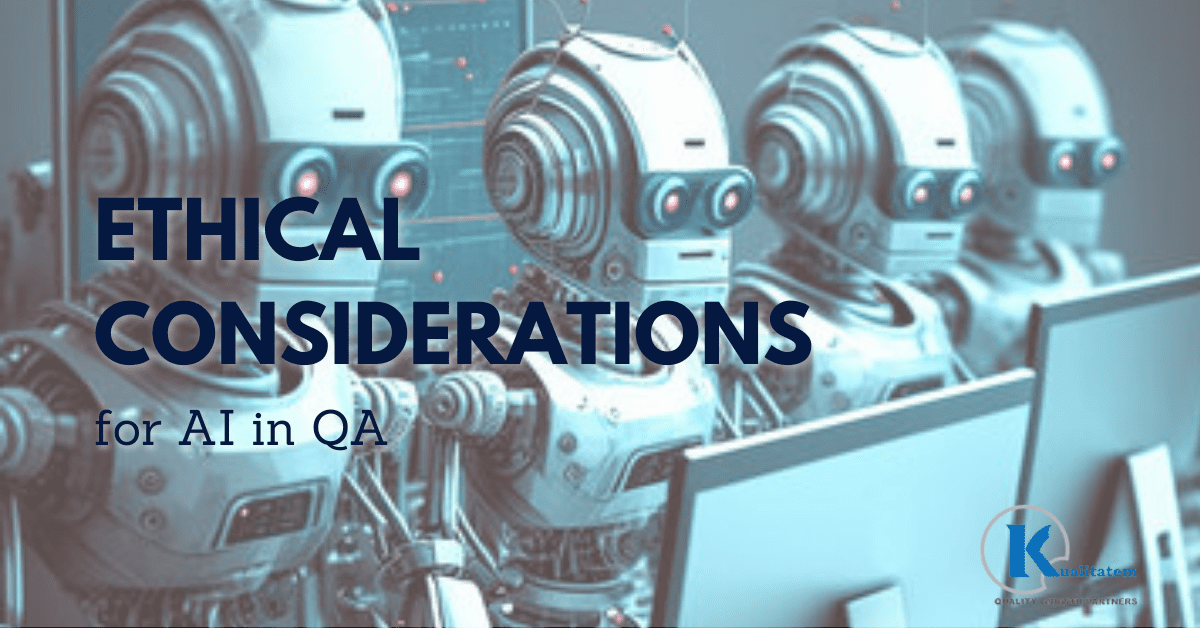Ethical Considerations for AI in Software Quality Assurance

- March 1, 2023
- admin
Software development requires quality assurance (QA) to make sure that finished products adhere to the necessary standards and specifications. Manual testing, however, takes a lot of time and is prone to mistakes. Artificial Intelligence (AI) has the potential to improve the efficiency and accuracy of QA testing, but its use raises ethical concerns that must be addressed. Organizations that are considering implementing AI for QA may be unsure of the ethical considerations that arise and how to address them.
The discipline of quality assurance is being revolutionized by artificial intelligence (AI) (QA). AI is assisting in increasing the effectiveness and accuracy of QA testing by automating repetitive processes. Yet, using AI for quality assurance presents ethical issues that must be resolved. In this article, we’ll explore the ethical considerations for AI in QA and provide guidance on how to address them.
Ethical considerations when using AI for QA
Bias in AI
One of the major ethical considerations when using AI for QA is the issue of bias. The objectivity of AI systems can only be ensured by the data used to train them. An artificial intelligence system will be prejudiced if the training data was biased. This bias can lead to unfair or discriminatory outcomes, especially in areas such as hiring and promotion decisions. It’s crucial to make sure that the data used to train AI systems is diverse and representative of the population to which it will be applied in order to reduce this danger.
For example, an AI system used for hiring that is trained on a dataset that is biased towards a particular race or gender may result in discriminatory hiring decisions. Bias in AI can occur at different stages, including data collection, data labeling, model selection, and system deployment. It’s crucial to make sure that the data used to train the system is varied and reflective of the population it will be deployed on in order to overcome bias in AI.
Transparency and Explainability
Another ethical consideration for AI in QA is the need for transparency and explainability. Because AI systems can be opaque and challenging to comprehend, it can be challenging to spot and correct potential biases or flaws. It’s crucial to create AI systems that are clear and understandable in order to address this. This can be done by using techniques such as model interpretability, which makes it easier to understand how the AI system is making decisions.
For example, if an AI system is used to detect defects in a manufacturing process, it’s important to understand how the system arrived at its conclusions in order to determine whether the system is accurate and reliable.
Privacy and Security
Security and privacy are further ethical issues for AI in quality assurance. Large volumes of personal data can be collected and processed by AI systems, which may cause privacy problems. It’s crucial to make sure that AI systems are created with privacy considerations in mind and that the necessary security measures are in place to secure sensitive data. Additionally, AI systems can be vulnerable to security breaches, which can lead to sensitive data being exposed. The security of AI systems must be ensured, and the necessary safeguards must be put in place to prevent unwanted access.
Human Oversight
Finally, human oversight is an important ethical consideration for AI in QA. While AI systems can automate many tasks, they are not infallible. It’s important to have humans involved in the QA process to ensure that the AI system is functioning as intended and to identify any errors or biases that may have been missed. Additionally, human oversight can help to ensure that the use of AI in QA is aligned with ethical principles and values.
For example, a human may need to review the results of an AI system used to detect defects in a manufacturing process and make a decision about whether a defect is actually present.
Conclusion
In conclusion, the use of AI in QA has the potential to improve the efficiency and accuracy of testing. But when utilizing AI in this situation, it’s crucial to address the ethical issues that come into play. This entails resolving concerns including prejudice, openness and comprehensibility, security and privacy, and human oversight.. By taking a proactive approach to these ethical considerations, organizations can ensure that the use of AI in QA is aligned with ethical principles and values.











